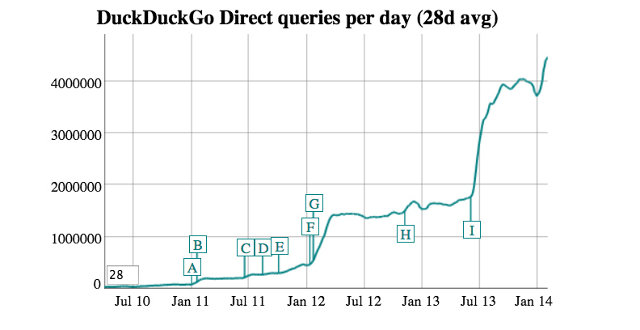DuckDuckGo, Google's Tiniest, Fiercest Competitor
When Gabriel Weinberg launched a search engine in 2008, plenty of people thought he was insane. How could DuckDuckGo, a tiny, Philadelphia-based startup, go up against Google? One way, he wagered, was by respecting user privacy. Six years later, we're living in the post-Snowden era, and the idea doesn't seem so crazy.
In fact, DuckDuckGo is exploding.
Looking at a chart of DuckDuckGo's daily search queries, the milestones are obvious. A $3 million investment from Union Square Ventures in 2011. Just prior to that, a San Francisco billboard campaign. Inclusion in Time's 50 Best Websites of 2011. Each of these things moved the traffic needle for DuckDuckGo, but none of them came close to sparking anything like the massive spike in queries the company saw last July. That's when Edward Snowden first revealed the NSA's extensive digital surveillance program to the world. The little blue line on the chart hasn't stopped climbing north since.

"Every year, we've grown 200-500%," Weinberg says. "The numbers keep getting bigger." As of early February, DuckDuckGo was seeing more than 4 million search queries per day. One year ago, that number had just barely broken 1 million.
Surprisingly, the sudden success didn't send the site crashing down. Nor did it change the company's stripped-down, razor-sharp focus. Here's how one small company is slowly, surely beating its way into the most monopolized category in technology.Three Ideas In One: Where DuckDuckGo Came From
Weinberg didn't originally set out to build a search engine. After shuttering one failed startup and selling another to Classmates.com for $10 million in 2006, the MIT grad found himself exploring several new ideas. Across multiple projects, he focused on structured data, Quora-style Q&A, and programmatically combating spam.
"I started all of these projects independently and none of them really took off," Weinberg says. "Then I realized, maybe if I put them all together, there might be an interesting search experience there."
The result was DuckDuckGo, a search engine offering direct answers to people's queries, rather than merely delivering a list of links. Below these so-called "Instant Answers," the site still displays traditional, link-by-link search results syndicated from third parties like Bing and Yandex but, crucially, they're filtered and reorganized to reduce spamSource
Comments
Post a Comment